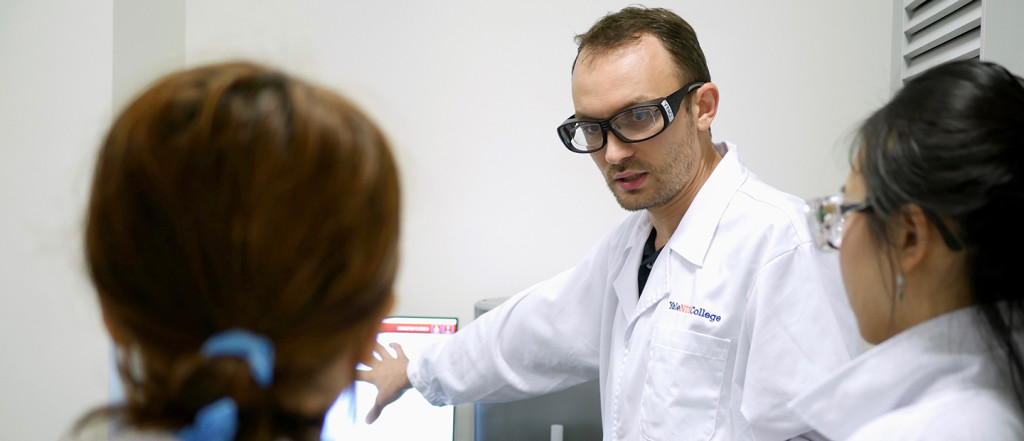New equipment enhances practical learning at the Yale-NUS science laboratories
Over the past semester, new scientific equipment has been installed at the teaching laboratories on the Yale-NUS College campus. The research-grade instruments allow students to gain hands-on experience and exposure to different methods of sample analysis.
The new equipment is generally more advanced than standard teaching tools, offering undergraduates the opportunity to conduct their own independent research studies. With their intended dual use for both teaching and research, the laboratories are an extension to the research capabilities for both faculty and students.
Assistant Professor of Science Stanislav Presolski, who specialises in chemistry and was involved in the purchase of a Nuclear Magnetic Resonance (NMR) instrument said: “We have designed our science classes in a way that makes them fairly indistinguishable from actual research.”
NMR spectroscopy, which works on the same principle as magnetic resonance image (MRI) machines used in hospitals, allows scientists to elucidate the structure of organic molecules at the atomic level. By providing students early exposure to such advanced equipment, the College helps them complement their theoretical learning, and gain practical research training.

Dr Presolski teaching students in the Foundations of Science course how to use the newly acquired Magritek’s Spinsolve 60 Carbon benchtop NMR spectrometer.
Isaac Lee (Class of 2019) recently took one of his classes in the newly furbished laboratories and had the opportunity to use the NMR machine. He said: “It’s different from learning about it and seeing how it is observed in the laboratories. It really helps make the recognition that science is made in the present and not just discovered long ago. We are constantly reaffirming it.”
The small class size – fewer than 18 students per class – at Yale-NUS means that professors are able to give tailored instruction to their students and provide the key skills needed to properly use the scientific equipment. “You are taught not only how to operate the machines, but also the physical principles behind the measurements, and ways to interpret the data without reliance on the default software,” explained Dr Presolski.
In the Common Curriculum, a set of courses which is part of every student’s Yale-NUS education, students have the opportunity to work closely with their professors in the laboratories for their first or second year classes. Students from a range of backgrounds, including those without previous experiences in science, learn about scientific methods and inquiry. This laboratory component forms an important part of the multidisciplinary approach of the Common Curriculum, which exposes student to multiple fields of academics including science, philosophy, literature, history and quantitative reasoning.
Beside teaching laboratories on the Yale-NUS campus, the College also has research laboratories located at the Campus for Research Excellence and Technological Enterprise (CREATE) in the NUS University Town and the NUS Yong Loo Lin School of Medicine, where students are able to work with professors on advanced research. On 5 August, the Yale-NUS@CREATE research laboratory was launched by the Science Division. The laboratory is equipped with chemical synthesis, spectroscopic characterisation, catalyst preparation and characterisation capabilities, allowing staff and faculty of Yale-NUS to look forward to greater research opportunities.
The enhancements to the Yale-NUS teaching and laboratory facilities aim to increase the potential for engaging in laboratory work in Yale-NUS courses and for research on campus. Students who are interested in furthering their scientific studies have a range of options at Yale-NUS, including working with professors as research assistants, majoring in Science, and participating in summer research projects.





